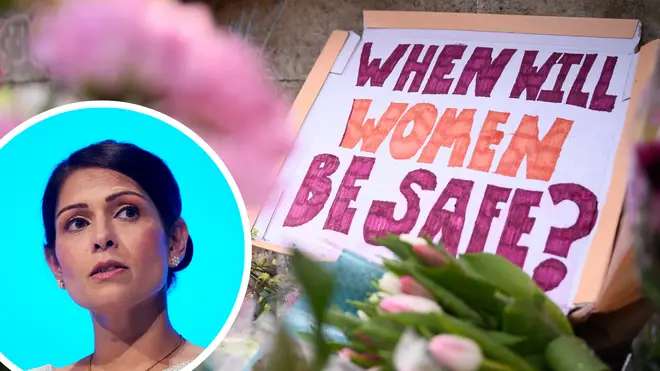
Paul Brand 10am - 12pm
21 July 2021, 11:04 | Updated: 21 July 2021, 11:09

Home Secretary Priti Patel has suggested that street harassment - including cat-calling and wolf-whistling - could be criminalised in the UK, as part of a new strategy around women's safety.
Over the past year, the topic of women's safety has been at the forefront of public discourse.
Following the murder of Sarah Everard, a 33-year-old marketing executive who was abducted on her way home near Clapham in March, there was a wave of protests calling for more to be done to protect young girls and women, as well as a review of the police.
The website Everyone's Invited, a forum for young girls to speak out about their experiences, also highlighted the staggering levels of "rape culture" in educational settings.
Writing for The Times on Wednesday, July 21, Ms Patel said the Government would "continue to look at gaps in existing law and how an offence for sexual harassment could address those."
She added: "I am committed to ensuring not only that the laws are there, but that they work in practice and women and girls are confident their concerns will be taken seriously.
"It is important that the police enforce the law and give women the confidence that if they report an incident, it will be dealt with."
Here, we take a look at the current laws in place around street harassment - and what the Government's new strategy will encompass.

Plans to make women and girls safer
The full document outlining the Government's new plan, which over 180,000 contributors have helped shape, is set to be published later today (July 21).
As well as seeking to criminalise so-called "virginity testing" in the UK - a "medieval" practice in which female genitalia is inspected to determine whether or not the hymen is intact - the plan will look to combat harassment on public transport.
Other items to be outlined in the proposal include the commissioning of a 24/7 rape and sexual assault helpline.
Meanwhile, the Government has pledged to tackle sexual abuse and harassment in higher education.
Ms Patel said: "The safety of women and girls across the country, wherever they are, is an absolute priority for me.
"It is unacceptable that women and girls are still subject to harassment, abuse, and violence, and I do not accept that violence against women and girls is inevitable.
"I am determined to give the police the powers they need to crack down on perpetrators and carry out their duties to protect the public whilst providing victims with the care and support they deserve.
"This strategy, shaped by the responses of those who bravely came forward and shared their stories and experiences, will deliver real and lasting change."
According to a recent survey by UN Women, over 70% of women in the UK of all ages said they had experienced sexual harassment in public - which includes at events, venues and on public transport.
Only 4% said they had reported these incidents to an official organisation, and a further 45% of women said they didn’t believe reporting would help change anything.
Additionally, in 2020, more than a fifth of rape referrals were "administratively finalised" by the Crown Prosecution Service.
On March 17 this year, the Government announced on an "experimental basis" it would ask the police to treat misogyny as a hate crime from the autumn.
Labour MP Stella Creasy celebrated the news on Twitter , exclaiming "we did it!"
🚨We did it! Government agrees in the House of Lords to ask police forces to treat misogyny as a hate crime from the autumn - now to make sure courts do in the sentencing bill ....bravo @fawcettsociety @citizens.uk @plan_uk @unwomenuk @centenaryactiongroup @jocoxfoundation ..1/3 pic.twitter.com/IKVwrI38Xn
— stellacreasy (@stellacreasy) March 17, 2021
Previously, back in 2016, Nottinghamshire police announced it would count wolf-whistling, cat-calling and other unwanted forms of verbal contact as hate crimes, in an effort to tackle sexist abuse.
The force then provided training for selected staff to help monitor and police these types of crimes.
Shadow home office minister Jess Phillips, said: "The services and support required to end violence against women and girls cannot run on warm words alone. How are we in a situation where we have better protections for statues than for women?
"Labour has set out a wealth of proposals to tackle Violence Against Women's and Girls but the Tories are dragging their feet. The Government should step up to the plate and take action rather than more warm words."
Rose Caldwell, the chief executive of Plan International UK, said the organisation was "very disappointed" the strategy does not include new legislation on public sexual harassment.
She said: "Without a new law, millions of girls will be left unprotected.
"However, the Government has recognised that this is an urgent issue that needs more attention.
"We urge the Government to quickly deliver its promise to review gaps in the legislation - and then it must commit to a new Public Sexual Harassment Law."